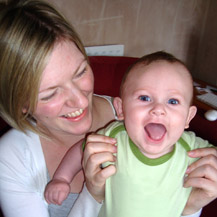The Biggest Loser: Crash Dieting Goes Primetime
The numbers are staggering. Contestants on the NBC primetime reality show “The Biggest Loser” have lost thousands of pounds over the show’s 13-season run, with some participants losing more than half their body weight during the competition.
The stories of the morbidly obese contestants on “The Biggest Loser” have inspired dieters around the world who want to shed extra weight and live longer, healthier lives. Watching a 500-pound man sweat and strain his way through a workout, only to be rewarded with a grilled chicken breast and small salad has led many viewers to think “If he can do it, so can I.”
The question remains, though: Is “The Biggest Loser” model the way to sustained weight loss, or simply crash dieting gone primetime?
Life on the Ranch
The premise of “The Biggest Loser” is simple: a group of 12 contestants move to a California ranch where they compete against each other to lose the most weight over 12 weeks. The contestants work with a trainer and end each week with a weigh-in. Each week the contestant who loses the least amount of weight is sent home. At the end of the 12 weeks, the person who loses the most weight is named the Biggest Loser and wins the competition.
And we’re not talking a few pounds, either. The very first winner of “The Biggest Loser” lost 122 pounds; subsequent winners have lost as many as 250 pounds. This incredible weight loss is achieved by working out for at least five hours a day and eating multiple small, healthy meals and snacks throughout the day. As in real life, contestants are tempted throughout the competition with tables laden with high-fat, high-calorie foods to test their wills and gauge their commitment to the process.
Lasting Results? It Depends…
Critics have called “The Biggest Loser” approach everything from unrealistic to dangerous. Former contestants report resorting to measures like spending hours in the sauna, avoiding water and eating nothing but Jell-O and asparagus to drop a few extra pounds before weighing in. And while the weekly weigh-ins often show dramatic weight loss, in some cases the weigh-ins actually occurred every 14 days. That means that someone could appear to have lost 20 pounds (or more) in a week, when in fact the real loss was around half that amount, thanks to the shooting and production schedule.
Perhaps more disturbing, though, are reports that many contestants put the weight back on as soon as they return to their regular lives. While a few contestants report losing even more weight after their stints on the show, most of the winners admit to regaining at least a few pounds once they leave the ranch. The most dramatic story was that of season 8 winner Erik Chopin, the first contestant to lose more than 200 pounds. After leaving the show, he was unable to manage his eating and exercise on his own and gained back more than 100 pounds. He’s since lost that weight and then some, but his journey has been anything but simple.
What We Can Learn from “The Biggest Loser”
While “The Biggest Loser” may not be the most accurate portrayal of the weight loss process, there are some important lessons that the average person can take away from the show.
First, a combination of a healthy diet and exercise is the only effective way to lose weight and keep it off. Sure, you might lose weight by doing one of those things, but for the most dramatic weight loss, you have to do both. Working out for 4 to 6 hours per day is out of the question for most people; it isn’t sustainable in the long-term and most people either don’t have the time or the physical ability to endure such prolonged workouts. An hour-long sweat session 4 to 5 days per week will help you burn calories and get and stay healthy.
Second, weight loss takes work. There is no “quick fix, miracle cure” for weight loss. While an episode of “The Biggest Loser” lasts for an hour, the contestants spend months at the ranch, devoting themselves day and night to the pursuit of losing weight. While the measures are extreme, unlike some shows or magazines, which only show before and after pictures, “The Biggest Loser” shows that weight loss requires commitment and effort.
There’s no denying that “The Biggest Loser” is compelling television. It’s hard not to cheer for someone struggling to better themselves and overcome adversity to have a better life. However, it’s clear that for most people the extreme model of weight loss espoused by the show isn’t practical. Still, the message of exercise and a healthy diet is a good one.
Image from Flickr’s Creative Commons
http://www.flickr.com/photos/mufan96/4806425725/sizes/l/in/photostream/
About the Author: A personal trainer and nutritionist, Janelle MacDonald has helped hundreds of people meet their weight loss goals. She recommends Diet to Go (diettogo.com) to new patients to learn about healthy portioning and eating. Click here to learn more.
- Posted on by Anita
- Posted in Uncategorized

